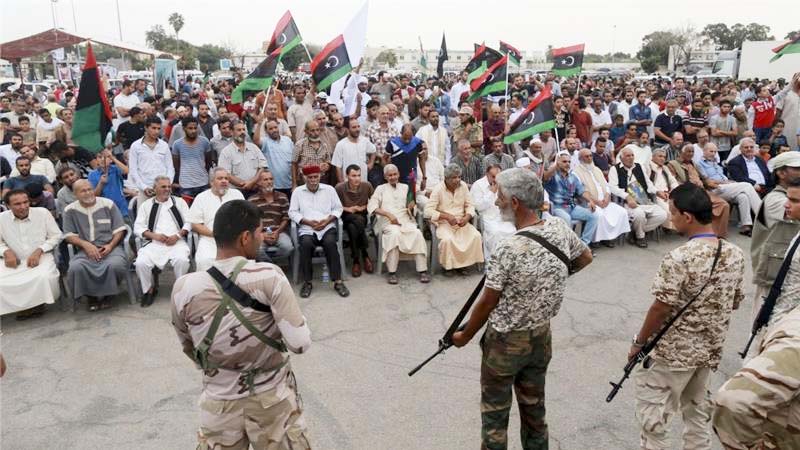
Al Jazeera News :
Lawmakers in the eastern Libyan city of Tobruk are under increasing diplomatic pressure to approve the UN-sponsored plan for a unity government, following an announcement earlier this week that they had rejected it.
Quizzed by a Libyan TV interviewer late on Wednesday, the speaker of the Tobruk-based House of Representatives (HoR), Agila Saleh, responded that that “the door of dialogue is not shut”.
Lawmakers in the parliament he heads were committed to “continued dialogue for the formation of a government of consensus” for the whole country, he told Libya’s Channel television. “Concessions will be needed from all sides.”
Since it was elected in June 2014 the HoR has been Libya’s internationally recognised government. Its initial mandate expired on Tuesday, however.
In a statement released in Brussels the previous day, the European Union, the US and an array of countries from Morocco to the United Arab Emirates had strongly urged all parties in Libya to accept the peace plan “without introducing further amendments”, in view of the risks of further instability.
The UN envoy for Libya, Bernardino Leon, on Wednesday said the HoR “had not been allowed to hold a vote” on whether or not to sign up to the the peace plan.
The speaker’s announcement on Monday that the parliament would not be accepting the plan had been followed by “a statement from what seems to be a majority of the members, insisting that there was no proper vote and no proper decision taken,” Leon told a press conference in Tunis.
“We still hope the House of Representatives will have the opportunity to express an opinion on the agreement in the coming days.”
He said certain “groups and personalities” had given out a “negative message” without suggesting alternative solutions, but the HoR “can expect the [continued] recognition of the international community” if it signed up to the deal.
The UN-sponsored plan would see the formation of a cabinet for the whole of Libya headed by a prime minister, with three deputy prime ministers, from the east, west and south of the country respectively.
The HoR would effectively continue in existence, while the rival General National Congress (GNC), which draws its support from the west of the country, would form the core a new state council upper chamber, with an advisory role.
The GNC, meeting in Tripoli, has for its part likewise withheld its approval from the deal, reportedly arguing that it does not provide sufficient guarantees that Islamic law will be implemented.
Both sides are also reported to have disputed Leon’s right to announce candidates for a unity government when its creation is still under negotiation.
Libya has had rival administrations since August 2014, when an alliance of militias, known as Libya Dawn, from the western city of Misrata took over Tripoli. The GNC, aligned with this movement, had rejected the results of the previous June election.
Lawmakers in the eastern Libyan city of Tobruk are under increasing diplomatic pressure to approve the UN-sponsored plan for a unity government, following an announcement earlier this week that they had rejected it.
Quizzed by a Libyan TV interviewer late on Wednesday, the speaker of the Tobruk-based House of Representatives (HoR), Agila Saleh, responded that that “the door of dialogue is not shut”.
Lawmakers in the parliament he heads were committed to “continued dialogue for the formation of a government of consensus” for the whole country, he told Libya’s Channel television. “Concessions will be needed from all sides.”
Since it was elected in June 2014 the HoR has been Libya’s internationally recognised government. Its initial mandate expired on Tuesday, however.
In a statement released in Brussels the previous day, the European Union, the US and an array of countries from Morocco to the United Arab Emirates had strongly urged all parties in Libya to accept the peace plan “without introducing further amendments”, in view of the risks of further instability.
The UN envoy for Libya, Bernardino Leon, on Wednesday said the HoR “had not been allowed to hold a vote” on whether or not to sign up to the the peace plan.
The speaker’s announcement on Monday that the parliament would not be accepting the plan had been followed by “a statement from what seems to be a majority of the members, insisting that there was no proper vote and no proper decision taken,” Leon told a press conference in Tunis.
“We still hope the House of Representatives will have the opportunity to express an opinion on the agreement in the coming days.”
He said certain “groups and personalities” had given out a “negative message” without suggesting alternative solutions, but the HoR “can expect the [continued] recognition of the international community” if it signed up to the deal.
The UN-sponsored plan would see the formation of a cabinet for the whole of Libya headed by a prime minister, with three deputy prime ministers, from the east, west and south of the country respectively.
The HoR would effectively continue in existence, while the rival General National Congress (GNC), which draws its support from the west of the country, would form the core a new state council upper chamber, with an advisory role.
The GNC, meeting in Tripoli, has for its part likewise withheld its approval from the deal, reportedly arguing that it does not provide sufficient guarantees that Islamic law will be implemented.
Both sides are also reported to have disputed Leon’s right to announce candidates for a unity government when its creation is still under negotiation.
Libya has had rival administrations since August 2014, when an alliance of militias, known as Libya Dawn, from the western city of Misrata took over Tripoli. The GNC, aligned with this movement, had rejected the results of the previous June election.

